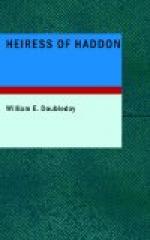He rubbed his eyes in sheer astonishment and looked again, but the second view only confirmed the vision of the first. His worst fears were realised; his Mary was dead!
Mechanically he walked to the tree; there was a paper fastened to it upon which was some writing in the hand of the baron. He read it:—
MaryDurden.
The storm availed her naught.
Impatiently he snatched it down, and tearing it into a hundred fragments, cast them down upon the ground, and slowly turning on his heels, he walked homewards, utterly dejected and cast down, and with a bitter heart. The last tie which bound him to Haddon was now severed, and he longed to get away.
In melancholy silence he dug a grave in the little garden behind his lowly cottage, and then, with all the coolness which is lent by desperation, he proceeded again to where the body was hanging, and cut it down. He had brought another paper with him, and this he affixed in exactly the same place as the one he had destroyed. It was laconical enough, for it had but one word, and that was
Revenge!
He laid the body in the grave, and put some plants upon the top, and then, after watering them with the tears which copiously ran down his cheeks, he turned his back on Haddon, and started for Nottingham with few regrets, leaving behind him little enough to love, and much to be revenged.
Footsore and weary he hastened to the Chapel Bar, glad indeed to find himself so near the end of his journey; but before he had quite reached it he had the mortification to hear the sound of the closing bell, and when he arrived there the gates were shut.
“Ho, ho, there, porter!” he cried, and he violently kicked the iron post by way of emphasis to the call.
“Aye, aye, there; steady now, thou’rt over late,” replied the burly porter as he tantalisingly rattled the heavy keys in his hand.
“Yes, but only a minute,” Edmund replied; “you can let me in, and you will.”
“Nay, master, not till next sunrise,” he returned. Edmund groaned.
“But I cannot stay outside all night,” he said. “Come, open the gate, there’s a good fellow.”
“I were like to lose my position if I did,” answered the other. “I cannot unless—,” and he significantly jingled some coins in his pocket.
“Unless what?”
The gatekeeper thought Edmund Wynne uncommonly dull of comprehension, and with a little hesitation he suggested that it were surely worth a trifle if he did break through the rule.
“Here, here’s a groat then,” exclaimed the smith, bringing out his last coin as he saw the other moving away.
“Pooh, a sorry groat!” said the keeper, “Make it two, and then!”
“But I must get in to-night,” expostulated Edmund, “I have urgent business with Sir Ronald Bury. It is important, it is a matter of the State.”




